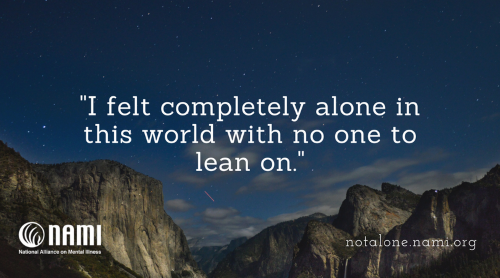April 26, 2018
By Justin Peck
If you or someone you know is experiencing a mental health, suicide or substance use crisis or emotional distress, reach out 24/7 to the 988 Suicide and Crisis Lifeline (formerly known as the National Suicide Prevention Lifeline) by dialing or texting 988 or using chat services at 988lifeline.org to connect to a trained crisis counselor. You can also get crisis text support via the Crisis Text Line by texting NAMI to 741741.

I woke up one morning and decided to drive into the canyons with my dog, Puma. I was planning to die by suicide. When my attempt didn’t work, I figured God wasn’t ready for me to exit this life just yet.
I don’t remember much about that day, but I do know that the intensity of thoughts, feelings and emotions have been a constant throughout my life. My mind races, and it’s almost impossible to focus on anything. My heart speeds up and I get to the point that it’s hard to breathe. I forget to breathe. My head spins so fast that my breathing turns very shallow, which in turn makes me dizzy. Dizziness disorients me, and I start to panic and worry about things that are trivial. The more I panic, the less control I have over my mind, until I finally reach a point where my entire body tingles in pain.
I’ve always put myself in situations that could turn out badly. As a race-car driver, I feel alive in risky situations. The days before my death, however, were different.
My spiral started with the despair of losing someone I loved deeply. I was struggling in business, family and racing. I felt completely alone in this world with no one to lean on.
As the days and weeks went on, the feeling got harder to control, until that fateful morning when I woke up and decided I’d had enough. At that time, I didn’t have anyone who would understand my family situation, my mental state and why I was in the darkest pit I’d ever been in. Even if I did have close family or friends to confide in, I thought it would’ve been such a burden for them to know what I was going through or what was running through my head. I felt weak and insignificant, and if I couldn’t fix what was going on in my head, there was no way anyone else could help.
My day in the canyons was a call-to-action. I visited with my doctor, Stan, and told him how desperate I was to conquer the depression I’d been battling for years, a depression made worse by my broken heart. We began a series of trial-and-error experiments with different medications that lasted four years. I was finally diagnosed with bipolar, following my attempted suicide.
I still struggle with my meds. I wish they’d be fast-acting, but they never are. It’s always a “take and wait” process that can sometimes be worse than the initial state of being. As I’ve gotten older, it seems like the disorder grabs me tighter with the pure intent of destroying me. Yet, with each experience, I understand those moments more and have a better grip on how to defeat them. It gets harder, yet I get wiser. The medication of experience is what keeps me moving to this day. It’s those small visuals of light I see when I talk to others who feel the same way that keep the timepiece moving.
I spent a lot of time in my car, listening to music, or lying in bed thinking about my life choices and how they got me to where I was. I thought about how I could change and be a better person and start affecting other people’s lives for good.
I took the time to figure it out for myself, but I haven’t figured it out all the way. I still make mistakes and have huge setbacks, but I make progress every day. The experiences I’ve had and the things I’ve learned I try to convey to others who are struggling. I want to be a positive influence when I share my successes and my failures so I can inspire others in their journey through this life.
Justin Peck is an off-road race car driver with bipolar disorder. After an attempted suicide, he had a wake-up call and a call to action to change not only his life but also the lives of others. Justin shares his story in his book, “Bulletproof.”
Note: This piece was adapted from Justin Peck’s book “Bulletproof”
We’re always accepting submissions to the NAMI Blog! We feature the latest research, stories of recovery, ways to end stigma and strategies for living well with mental illness. Most importantly: We feature your voices.
LEARN MORENAMI HelpLine is available M-F, 10 a.m. – 10 p.m. ET. Call 800-950-6264,
text “helpline” to 62640, or chat online. In a crisis, call or text 988 (24/7).